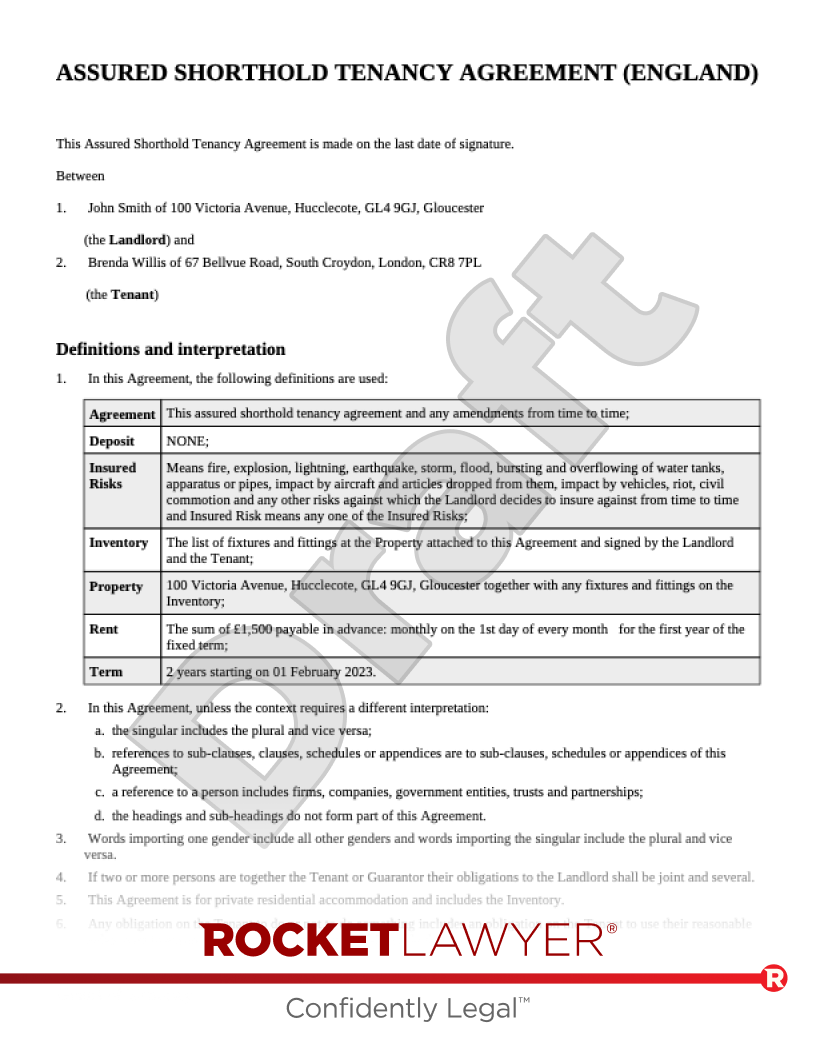Rent
The rent will be the market rent for similar properties in the local area.
The Tenancy agreement (including occupation contracts in Wales) will fix the rent for an initial period and the rent cannot be increased during this time.
Rent payments
Tenants should pay the rent in accordance with their residential lease. Their agreement should specify how much the rent is, when it is payable and where the rent is to be paid (eg to the landlord’s specified bank account). The rent can be paid in a number of ways including:
-
in cash - a Rent receipt should always be requested when making rental payments in cash
-
by cheque - if a cheque is lost in the post, it’s the tenant's responsibility to make good the rent payment
-
by bank transfer - the rent payment is considered to be made as soon as it leaves the tenant’s bank account
The rent becomes due on the morning of the day identified in the residential lease as the payment date. However, the rent does not become overdue until midnight on that day. The landlord can only take action for late payment of rent once the payment becomes overdue. While rent can be payable on Sundays, any rent that is due on a bank holiday will not be payable until the next business day.
Generally, rent is payable in advance and must be paid by the tenant to their landlord (or their landlord’s agent). A tenant’s spouse or civil partner can pay the tenant’s rent as such rent payments are treated as being made by the tenant. Any rent payment made by someone else on behalf of the tenant (eg a parent, child or friend) must be authorised or subsequently ratified by the tenant.
If a tenant is late paying the rent, a Rent demand letter should be sent as a provider. This must specify the name and address of the landlord.
Rent increase
England
The rent cannot be increased during the initial fixed period.
If you want to increase the rent at a later date in line with market conditions, you can end the tenancy unless the tenant agrees to an increase. For more information, read Private renting rent increases.
If the tenant does not agree, you can either accept the position or end the tenancy by issuing a Section 21 (Form 6A) notice.
Wales
If you’re a landlord in Wales you can increase the rent. However, the process depends on the type of occupation contract you have in place.
For secure contracts and periodic standard contracts, you can only increase the rent once per year. To do this, you must use the correct form giving the contract holder at least 2 months’ notice.
For standard occupation contracts, you can increase the rent if the contract holder agrees to the increase or by virtue of a rent increase provision included in the contract.
For more information, read Variations of rent in Wales.
Scotland
If you’re a landlord in Scotland with a private residential tenancy, you can only increase rent once per year. To do so, you must give at least 3 months' notice and use the correct form. If your tenant thinks the increase is unfair, they can apply to the Private Renting Housing Panel to set a fair rent. A private residential tenancy can only be terminated if one of the 18 grounds for eviction applies. For more information, read Private renting rent increases in Scotland.
Deposits
It is a good idea to ask the tenant to pay a deposit at the start of the tenancy to cover cleaning, breakage and damage that may occur during the tenancy.
England and Wales
The maximum level of tenancy deposit you can ask a tenant to pay depends on the total annual rent for the property:
-
up to 5 weeks’ rent if the total annual rent for the property is less than £50,000
-
up to 6 week’s rent if the total annual rent for the property is £50,000 or above
In England and Wales, deposits taken by landlords of assured shorthold tenancies or occupation contracts (with rent up to £100,000 per annum) must comply with the tenancy deposit protection scheme.
The Government-backed schemes are:
The schemes contain an Alternative Dispute Resolution (ADR) service which is free of charge. A dispute will only go to court if both landlord and tenant cannot agree to use the ADR service.
You will also need to provide the tenant with certain prescribed information.
Scotland
In Scotland, a deposit must not be more than 2 months' rent. If you take a deposit from your tenant, it must be paid into an approved deposit protection scheme. This must be done within 30 working days of the tenancy start date. The Government-approved schemes are:
For more information, read Deposit protection schemes.
Once a deposit has been registered, you will also need to provide the tenant with certain prescribed information.
Bills and utilities
Collecting the rent and any additional outgoings will be set out in the tenancy agreement but some practical steps you should consider include:
-
insurance - ensure that you have suitable cover for letting under both the buildings and the contents insurance. Failure to inform your insurers may invalidate your policy
-
bills - arrange your outgoings such as service charges, maintenance contracts and so on, to be paid by direct debit or standing order
-
council tax and utilities - arrange for the transfer of the council tax and utility bills to the tenant; take gas and electricity meter readings to ensure that utilities have been paid to date
-
telephone - you will probably also want to transfer the telephone into the tenant’s name




